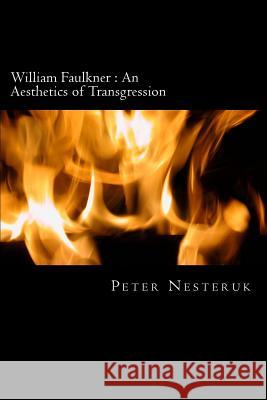William Faulkner: An Aesthetics of Transgression: A Study in Excess, Identity and Exchange » książka
William Faulkner: An Aesthetics of Transgression: A Study in Excess, Identity and Exchange
ISBN-13: 9781494824198 / Angielski / Miękka / 2014 / 190 str.
This monograph attempts to answer the question that is the key to the best of Faulkner: why is it that it is the most difficult and most transgressive of Faulkner's books that have attained classic status? I argue that difficulty in reading enacts and conceals, describes and performs, that is, both hides and provokes a search which is at once literary and anthropological, and intellectual and emotional. Formal transgression (experimental modernism) conceals (and reveals) content transgression (the 'taboos' of Faulkner's world) in a style that unites Faulkner's Southern Regionalism with International Modernism and art-house or literary who-done-it with a performative rituality that co-opts the reader into an experience akin to an ritual initiation. We do not just visit Faulkner's world: we inhabit it. Every trick in the literary rhetorical canon is employed by Faulkner in his literary quest to involve the reader in a way of life, a horizon of expectations, or cultural-emotional point of view in which the liberal-minded reader might not feel entirely happy. Also employed are theories of the constitution of the subject and time, subjectivity and agon (self as the product of a continual social contest, both real and imaginary), the much debated role of transgression in literary Modernism and ritual-type experiences. The monograph will be divided into five chapters (with an Introduction framing literary antecedents, methodological approaches, key arguments and general concerns). Chapter One features a detailed textual examination of Faulkner's classic, The Sound and the Fury, showing how Faulkner uses temporal rhythm (speed and manner of oscillation between past present and future) as a means of creating the individual character viewpoints that structure this text (and so structure the consciousness of the reader). Chapter Two on Sanctuary and its sequel Requiem for a Nun discusses gender roles and their linkage to geography and symbolic time. A discussion of the rhetoric of disability and the deployment of competing notions of innocence and guilt as a means of further exploiting the theme of differences of race and gender will indicate the limits of the ethical stance adopted by the (implied) author in these novels. Chapter Three on Light in August, focuses on variations on the theme of subject formation and imposed identities (including the implications of the philosophical theories of Hobbes and Hegel on social being and the political as struggle for recognition and identity). This chapter includes a discussion of the ethical implications of the contrasting incorporation of the genres of comedy and tragedy with respect to the implied subject position of the text's readership. Chapter Four on Absalom, Absalom offers an entirely original reading based upon the notion of sacrificial exchange as identity creation (and the relation of this, in turn, to the reader's identity) which reverses many previous readings of this, perhaps Faulkner's most 'difficult' text. Lastly, Chapter Five on Go Down, Moses brings together the themes of previous chapters in the light of this book's concerns with restitutions and omissions, what we have come to call, in one of the key euphemisms of our time, 'historical problems'. Because of its concerns with questions of responsibility and guilt, this text is, perhaps above all others, the central work in the debate over the deployment of the rhetoric of 'race' in Faulkner's work. A reflection on the role of 'Nature' 'Realism' and the rhetoric of morality (together with those 'other' subjectivities associated with this key literary nexus) in the history of American literature will be included in this chapter.
Zawartość książki może nie spełniać oczekiwań – reklamacje nie obejmują treści, która mogła nie być redakcyjnie ani merytorycznie opracowana.











